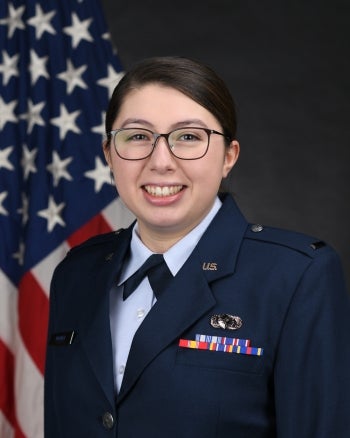Editor’s note: This story is part of a series of profiles of notable fall 2024 graduates.
For the past year and a half, Ariel Parker has spent countless hours on the laptop at the kitchen table of her California home. With her cats nearby for comfort, she has worked toward earning a Master of Legal Studies (MLS) from the Sandra Day O’Connor College of Law at Arizona State University. And, now, this fall, it all pays off.
Originally from South Carolina, Parker joined the U.S. Air Force after earning her undergraduate degree. There, she was introduced to the world of contract management, which would ultimately shape her career path.
While Parker initially knew little about the field, her work in military procurement piqued her interest. She was tasked with interpreting regulations and strategizing ways to procure supplies for the military. As she gained more experience, she realized how impactful contracting is — not only for the federal government, but for the private sector as well.
Determined to become more knowledgeable in her line of work, Parker used her military tuition assistance to go back to school. After searching for programs related to contract management, she came across the MLS program at ASU Law. At the time, she was stationed overseas and needed a flexible and fully online program.
“When I found ASU Law’s MLS program, it felt like the stars aligned,” Parker said. “When I realized there was a contract management and conflict resolution emphasis I could mix and match courses from, I was sold.”
The combination of coursework and practical experience has made the program a natural fit.
“I received a lot of training from people who have been in my career for more than 20 years," she said. “Many times I knew the rules, but never fully knew why they existed. I enjoyed reading my government contract textbook and learning about legal cases that set various precedents, which in turn influenced many of the laws, statutes and regulations we have to follow in federal procurement.”
Parker will graduate in December and plans to remain on active duty for the next four years, during which she will continue her work in government contracting.
In the below Q&A, Parker shares what she loved about her ASU journey and where she plans to go from here.
Note: Answers may have been lightly edited for length and/or clarity.
Question: What’s something you learned while at ASU Law — in the classroom or otherwise — that surprised you or changed your perspective?
Answer: I loved all the courses I took related to conflict theory. It was surprising to retrospectively analyze how I respond to conflict and compare that to the strategies and best practices presented in the courses. It changed my perspective on how to deal with conflict professionally.
Q: Which professor taught you the most important lesson while at ASU Law?
A: The professor who taught me the most important lesson was Tyson Winarski. I enjoyed his intellectual property (IP) law course because it broadened my knowledge and perspective on why IP is important for a business.
Q: What’s the best piece of advice you’d give to those still in school?
A: Talk to your peers and take advantage of their insights. So many folks in the MLS program have different backgrounds and areas of expertise. While the coursework is amazing, you can learn so much more about real-world applications from reading your classmate's posts and engaging with them about those experiences.
Q: If someone gave you $40 million to solve one problem on our planet, what would you do?
A: While not directly related to our planet, I would use the money to support research aimed at cleaning up space debris in low Earth orbit.
Space technology is critical to the entire world, with heavy investments in launching satellites and improving related technologies. However, there is currently no leading effort to address the growing problem of space junk.
A concept known as "Kessler syndrome" suggests that the orbits around Earth could become so overcrowded with debris, such as fragments from satellite collisions, that they could become hazardous or even unusable. This would have devastating consequences for satellite-dependent technologies like GPS, weather forecasting and communications. While $40 million may not be enough to fully solve the issue, it could serve as a crucial first step toward addressing the problem.
More Sun Devil community

Barrett program unlocks study abroad for first-year honors students
Twenty first-year students from Barrett, The Honors College at Arizona State University are spending their second semester studying abroad in Rome, Italy.Traveling in a tight-knit honors community…

A champion's gift: Donation from former Sun Devil helps renovate softball stadium
Jackie Vasquez-Lapan can hear the words today as clearly as she did 17 years ago.In 2008, Vasquez-Lapan was an outfielder on Arizona State University’s national championship-winning softball team,…

Student-led business organization celebrates community, Indigenous heritage
ASU has seen significant growth in Native American student enrollment in recent years. And yet, Native American students make up less than 2% of the student population.A member of the Navajo Nation,…


